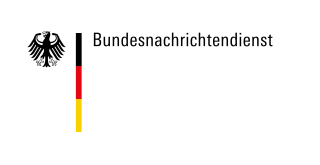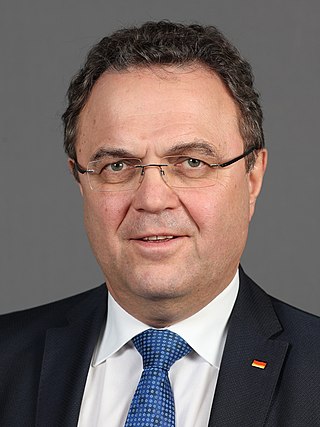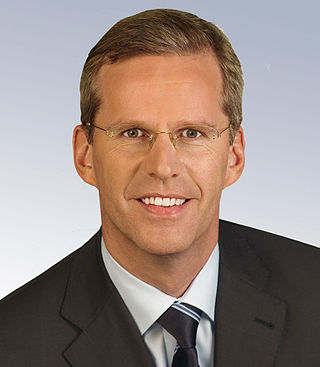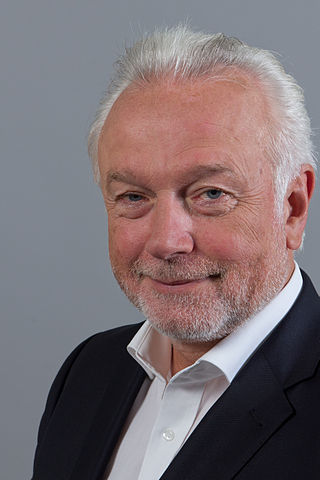
Gerhard Schindler (born 4 October 1952 [1] in Kollig, West Germany) is a German civil servant and former President of the Bundesnachrichtendienst (BND), the German Federal Intelligence Service.

Gerhard Schindler (born 4 October 1952 [1] in Kollig, West Germany) is a German civil servant and former President of the Bundesnachrichtendienst (BND), the German Federal Intelligence Service.
Schindler's parents are from Transylvania and Bessarabia. He completed his Abitur in 1972 [1] and spent his military service in a Paratrooper division of the Bundeswehr , the German armed forces. He is an Oberleutnant of the reserves. [1] He began studying legal science in 1974 at Saarland University in Saarbrücken. He passed the first and second German legal exams in 1980 and 1982 respectively. [1]
Schindler served as a Law Enforcement Officer for the Bundesgrenzschutz (Federal Border Guard). In 1985, he became an instructor in the Civil Defense department of the Federal Ministry of the Interior. He served at the Federal Office for the Protection of the Constitution in Cologne from 1987 to 1989 as a division head. In 1989, he returned to the Federal Ministry of the Interior. He served as director of the budget department, permanent representative of the leader of the headquarters and leader of the "Modern State - Modern Administration" administrative department. In 2003, he became the leader of the Counter-terrorism department. Since 2008, he has been Undersecretary for Public security. Within this role, he has provided supervisory oversight for the Federal Criminal Police Office and the Federal Office for the Protection of the Constitution. [2] He is seen as an authority on crime, terrorism, IT security, and computer crime. In 2012, he replaced Ernst Uhrlau as president of the Bundesnachrichtendienst . [3]
Since November 2016 Schindler is consulting businesses in security issues at the consulting company friedrich30. [4] [5]
Schindler has been a member of the Free Democratic Party since university. From 1989 to 1994, he was a member of the local council in Nörvenich.
He is married and has one child.
Schindler made headlines in May 2012 when he used his personal agency airplane (a Dassault Falcon 900) to transport a rug weighing 30 kilograms (66 lb) from Afghanistan back to Germany for free as a "personal favor" for Dirk Niebel, the Federal Minister of Economic Cooperation and Development. Niebel did not make a customs declaration or payment of duty until after the issue was investigated by Der Spiegel , a German weekly news magazine. [6] [7] [8] [9] Schindler and Niebel's public statements contradicted each other. [10]
In July 2013, Schindler was pressed for answers in the wake of the Global surveillance disclosures when it was reported that the German Army was using PRISM to support its operations in Afghanistan as early as 2011. [11] The BND stated that a separate NATO platform was in use, which was contested by the Federal Ministry of Defence. [12]
Beginning on 10 August 2013, German media reported that under Schindler's direction, the BND was passing mobile phone data to the United States that was used in the U.S.'s targeted killing program. [13]
In April 2015, Schindler was criticized by politicians of all parties in the German Parliament for the BND's cooperation with the NSA for spying on European firms and politicians, including German interests. [14] The Left and the Green Party called for Schindler to be fired; the Social Democratic Party, the junior coalition partner, called for an investigation. [15]

Hans-Christian Ströbele was a German politician and lawyer. He was a member of Alliance 90/The Greens, the German green party.

The Federal Intelligence Service is the foreign intelligence agency of Germany, directly subordinate to the Chancellor's Office. The BND headquarters is located in central Berlin. The BND has 300 locations in Germany and foreign countries. In 2016, it employed around 6,500 people; 10% of them are military personnel who are formally employed by the Office for Military Sciences. The BND is the largest agency of the German Intelligence Community.

Bad Aibling is a spa town and former district seat in Bavaria on the river Mangfall, located some 56 km (35 mi) southeast of Munich. It features a luxury health resort with a peat pulp bath and mineral spa.

Dirk Niebel is a German politician. From 2009 to 2013, he served as Federal Minister of Economic Cooperation and Development. From 2005 to 2009, he was secretary general of the FDP.

Thomas Ludwig Albert Oppermann was a German politician and member of the Social Democratic Party (SPD). From October 2017 until his death he served as Vice President of the Bundestag. In his earlier career, he served as First Secretary (2007–2013) and later as chairman (2013–2017) of the SPD Parliamentary Group in the Bundestag.

Hans-Peter Friedrich is a German politician of the Christian Social Union (CSU) who has been serving as a member of the German Bundestag since 1998. Under the leadership of Chancellor Angela Merkel, he served as Federal Minister of the Interior (2011-2013) and as Minister for Food and Agriculture (2013). Friedrich resigned from that position in February 2014. Friedrich has a controversial history with minorities in Germany, causing outrage in 2013 after telling journalists that Islam in Germany is not something supported by history at any point.

Clemens Binninger is a German politician of the CDU. Binninger was a member of the Bundestag from 2002 until 2017.
Bruno Guntram Wilhelm Kahl is a German civil servant and administrative lawyer. Since 1 July 2016, he has been President of the Federal Intelligence Service (Bundesnachrichtendienst).
During the 2010s, international media reports revealed new operational details about the Anglophone cryptographic agencies' global surveillance of both foreign and domestic nationals. The reports mostly relate to top secret documents leaked by ex-NSA contractor Edward Snowden. The documents consist of intelligence files relating to the U.S. and other Five Eyes countries. In June 2013, the first of Snowden's documents were published, with further selected documents released to various news outlets through the year.
Global mass surveillance can be defined as the mass surveillance of entire populations across national borders.
The Nachrichtendienstliches Informationssystem (NADIS) is a searchable database operated by the German domestic security agency Bundesamt für Verfassungsschutz (BfV). Data stored in the system is readily assessible by the BfV, the foreign intelligence agency Bundesnachrichtendienst (BND), and the military intelligence agency Militärischer Abschirmdienst (MAD).
The German Parliamentary Committee investigation of the NSA spying scandal was started on March 20, 2014, by the German Parliament in order to investigate the extent and background of foreign secret services spying in Germany in the light of the Global surveillance disclosures (2013–present). The Committee is also in search of strategies on how to protect telecommunication with technical means.

Operation Eikonal is a collaboration between the National Security Agency (NSA) and Bundesnachrichtendienst (BND) for the sharing of telephony and Internet data captured in Germany. It is based on an agreement that dates to 2002, and is part of the NSA operation "RAMPART-A". Surveillance started in 2003, telephony data was collected from 2004 onwards, and all Internet traffic from the Deutsche Telekom (DT) switching center in Frankfurt was captured starting in 2005.

Wolfgang Kubicki is a German politician of the Free Democratic Party of Germany (FDP) and member of the Bundestag from 1990 until 1992 and 2017 onwards. He has been vice chairman of the FDP in Germany since December 2013. Since 24 October 2017 he has served as Vice President of the Bundestag. From 1992 to 1993 and from 1996 to 2017 he served as chairman of the FDP-group in the Schleswig-Holstein state parliament.
Targeted surveillance is a form of surveillance, such as wiretapping, that is directed towards specific persons of interest, and is distinguishable from mass surveillance. Both untargeted and targeted surveillance is routinely accused of treating innocent people as suspects in ways that are unfair, of violating human rights, international treaties and conventions as well as national laws, and of failing to pursue security effectively.
The Parliamentary Oversight Panel (PKGr) is a committee of the German Bundestag responsible for oversight of the intelligence agencies of Germany. The PKGr monitors the Federal Intelligence Service, the Military Counterintelligence Service, and the Federal Office for the Protection of the Constitution. Under the Control Body Act, the federal government is obliged to inform the PKGr comprehensively about the general activities of the federal intelligence services and about events of particular importance.

Lutz-Georg Stavenhagen was a German politician and member of the Christian Democratic Union of Germany (CDU). He was Minister of State in the Foreign Office from 1985 to 1987 and Minister of State in the Federal Chancellery from 1987 to 1991.

Bernd Schmidbauer is a former German politician and member of the Christian Democratic Union of Germany (CDU).

The Consolidated Intelligence Center in Wiesbaden, Germany, is a controversial US intelligence facility under construction by the US Army Europe, located on the grounds of the Lucius D. Clay Barracks in Wiesbaden-Erbenheim, formerly Wiesbaden Army Airfield, about eight kilometres southeast of downtown Wiesbaden. The purpose of the facility, according to the US Army, is to support US forces with tactical theatre-of-war support and strategic intelligence functions. As such, it is implied that data fusion would also take place at this location.

Operation Rubicon, until the late 1980s called Operation Thesaurus, was a secret operation by the West German Federal Intelligence Service (BND) and the U.S. Central Intelligence Agency (CIA), lasting from 1970 to 1993 and 2018, respectively, to gather communication intelligence of encrypted government communications of other countries. This was accomplished through the sale of manipulated encryption technology (CX-52) from Swiss-based Crypto AG, which was secretly owned and influenced by the two services from 1970 onwards. In a comprehensive CIA historical account of the operation leaked in early 2020, it was referred to as the "intelligence coup of the century" in a Washington Post article.